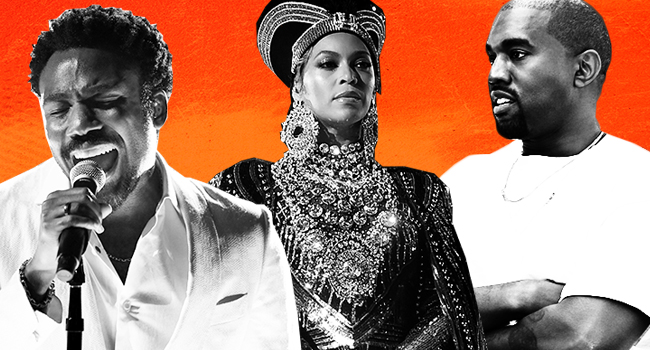
Donald Glover — aka Childish Gambino — dropped the thought-provoking video for “This Is America” last weekend, and it’s caused a firestorm of reaction. I’m not going to bore anyone with another take on Glover’s polarizing work. I’m more focused on the cringe-worthy takes that paralleled one woman’s, “when God closes a Kanye, he opens a Childish Gambino” aphorism. There was also a tone-deaf observation that “Kanye declares himself a genius drops ‘poopty scoop,’ Donald Glover drops #ThisIsAmerica & says nothing.” Another person decreed that “Donald Glover is doing what Beyonce pretends she’s doing,” followed by “don’t @ me,” — which has never actually stopped a conversation on Twitter. And in this case, that person needs to have one.
Aside from the casual misogynoir of putting down Beyonce (or Janelle Monae) to extol Glover, these observations irk because it’s rare to see this kind of take when it comes to music with no illusions of social urgency. The next time Future releases a project, I don’t expect to see his fans opining that “Future talks about getting high the way Young Thug thinks he is” or “no one else is talking about having shooters like this.” The desensitization to “money, hoes, clothes” content is so rife that most would never think to police which artists can corner the market on it.
Surely, if Tee Grizzley and G Herbo get to shoot ‘em up with equal agency, then other Black artists deserve space to present their social and political statements independent of each other. Millennials get to enjoy an abundance of top-tier Black musicians presenting subversive art, but the impact is dampened by conversations that sway attention from the provocative topics they’re touching on.
In a recent piece, Billboard noted that, “fans have long lamented the disappearance of the fabled Old Kanye, but never before have they been so quick and so passionate to anoint his successor.” Which begs the question: Successor to what?
There may have been an era when Kanye was the solitary pop music avenue for content steeped in pro-Blackness and poignant social commentary, but that day is long gone. His approach has become a norm, not the exception, which renders the “new Kanye” concept too dated to even speculate on bestowing. It’s akin to suggesting that the Black community needs a unilateral leader — a la Malcolm X or Martin Luther King — as if there aren’t dozens of organizations fighting for Black liberation in a variety of contexts. Likewise, there are several festival-headlining acts within music pumping out provocative work that reflects the diverse spectrum of Blackness and challenges societal norms.
Donald Glover’s recent visual tackled America’s bloodlust and the predation of Black people. Janelle Monae’s Dirty Computer challenges perceptions of sexuality and gender. Beyonce’s Coachella performance and most recent album have been staunchly Pro-Black works. J. Cole’s KOD tackled America’s drug epidemic, fatherhood, and infidelity. Jay-Z’s 4:44 did the same, along with theories on getting out from under the thumb of capitalism — or at least winning in its zero-sum game. Kendrick Lamar once again broached notions of faith and morality on the Pulitzer Prize-winning DAMN. Not to mention rugged artists like Nipsey Hussle, YG, Rick Ross, and T.I.’s social commentary, which is re-infusing so-called gangster rap with the education that Pimp C once bemoaned the absence of.
These artists are ardently aiming to amplify major issues in the Black community. Their work deserves stimulated feedback which analyzes the systems they’re targeting, not merely the half-baked comparison to someone who made similar points. Just like there’s no need to pit female rappers against each other for some arbitrarily sole “spot,” there’s no need to appraise provocative artists on a curve or anoint token “artistic geniuses” exclusive domain over political art.
It is absolutely fair to pull out the “Great Value” epithet for artists who are blatantly jacking another’s style, but it’s unwarranted for artists who are merely talking about the same issues. Kanye, Donald Glover, Beyonce, Janelle Monae, Kendrick Lamar, and J. Cole all approach their craft in disparate ways. Their reflections on Black identity are going to occasionally intersect, but that doesn’t justify one artist’s perspective being pitted against another to see who is superior.
This de-centering of artists’ objectives disarms the potency of their art, as social media debates often devolve into fan wars and name-calling sessions rather than productive debates. It often feels like artists are trivialized as avatars for different identities and subsects of Blackness, and those who relate to a particular artist will compulsively flout their superiority as a means of self-aggrandizement. In that manner, iconic artists become mere apparatus of their fans’ egos, stripped of their agency by the very community they’re trying to enlighten. The social mediasphere may be unaware of how much they inadvertently dehumanize and trivialize their favorite artists into trump cards, but it’s starkly apparent every time they’re used to censure another act’s expression.
The longer this environment of needless comparison persists, the greater the chance that artists begin releasing subpar work indicative of undue creative pressure — or worse yet, not approach pressing topics at all because it’s Kendrick or J. Cole or Beyonce’s “turf.” Both circumstances would stifle the dynamism that a cadre of evocative artists is rewarding to the culture. It does no good to pit one so-called “conscious” artist against another because they’re all working toward the same goals: Expanding the canon of Black art and galvanizing people toward substantive action and change.






